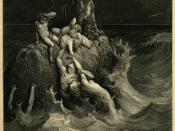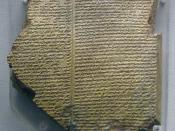The two accounts of the great flood as they appear in Gilgamesh and later in the Bible show two different versions of what appear to be the same story, and at the same time speak very differently about each culture's respective values. The first difference mentioned is the reason each story's God or gods decided to flood the earth. In Gilgamesh, the god Enlil was "aroused by the clamour" of the people of Earth, and decided to end the existence of mankind, simply because of their nuisance (41). This paints a picture of a system of gods that is very arbitrary in their punishments, but this does not make their punishments less harsh. This suggests that those inhabiting the Middle East at the time of Gilgamesh's writing were probably a people that were very afraid of their gods and goddesses and did all they could to appease them and not incur their seemingly random punishments.
The justification of the flood as given by the Christian God is a different one entirely. In Genesis, God is described as seeing that "the wickedness of man was great in the earth", but this was not cited as his reason for the flood (55). The Bible states that God was not so much angry at the "wickedness of man" but that it "grieved him at his heart" that his creations turned out in such a way (55). On face value, this seems to imply a more caring, compassionate, and ultimately superior God in the Christian culture, but this is not necessarily so. Perhaps this God is just as arbitrary, if not more so, than the gods of Gilgamesh for being so willing to give up on what he thought was his greatest creation and just start over.
If anything, the length and...



Good
Good essay overall, if a bit short. Why did you keep referring to the Genesis flood story as the Christian one. Noah and the flood myth originated with Judaism about 700 years before Christianity even existed.
0 out of 1 people found this comment useful.